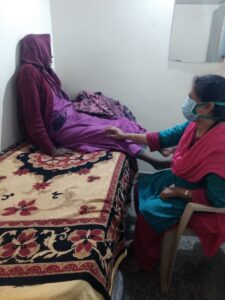Challenges in caring for the LGBTI Community: A Counsellor’s Perspective
– Ms. Poornima Prakash, Bengaluru
Providing palliative care to patients of the LGBTI community comes with its own sets of challenges due to their unique needs and circumstances. This article tries to accentuate a few of those challenges I faced while taking a particular case into consideration.
The patient was admitted to the hospice with CA Buccal Muccosa and was also a known case of HIV/AIDS. She identified herself as a transgender and wished to be addressed with the pronouns she/her. This was the first HIV+ case that the hospice had to deal with; and we therefore took extra precautions while dressing her wounds, administering her medications etc. I learnt that the patient had undergone a few anatomical changes, post her sex change operation. I personally found it challenging to comprehend the physical changes that she had undergone, due to being a counsellor and not a doctor.
As we began interacting, the patient shared that she was currently living with a transgender community as she had been isolated from her family after she revealed her gender identity and her inclinations. She went on to add that though she belonged to a community that functioned like a family, yet at most instances she felt sad and depressed since she was alienated by her own biological family.
Over time I also noticed that the patient, belonged to a closely knit transgender community; just like most other transgender communities function. While I admired the this close bondage, it unfortunately posed to be a challenge during the counseling sessions as the family members kept repeatedly enquiring about the patient’s health condition despite them being aware of their loved one’s (patient’s) diagnosis and prognosis. This experience cemented within me something I had heard of before; members belonging to this community tend to always look out for and take care of one another, as they as a community, always feel alienated and abandoned by the general public. The other stark challenge that I had to maneuver during counseling, was to effectively conduct group therapy sessions. The lack of awareness and the absence of an ‘attitude of inclusiveness’ within the community, made the other patients’ and their caregivers uncomfortable to have this patient’s presence in the group.
I had learnt during one of our one-on-one counselling session’s with the patient that she was married to a man and that she was his second wife, as he was already married with a family. As the disease progressed rapidly, the patient expressed her desire to meet her husband one last time. My first attempt in persuading her husband to meet her failed when he refused to visit her as he had not openly acknowledged their relationship in the society. After a couple of such futile attempts, I succeeded in convincing him to finally visit her. Though reluctant, he did come and visit her for one last time at the hospice. Although she was elated to see him, she also did feel discriminated and disregarded for being a transgender. Upon reflection, I realized that one needs to be skillful and have prior knowledge of ‘Nirvana’ while approaching conversations pertaining to a transgender patient’s relationship status and matters relating to sex.
The final challenge for me, specific to this case, was to successfully navigate and manage the emotions of the other members of her community as her condition deteriorated over time. Her loved one’s often turned up in huge numbers and got emotional, vocally and at high decibel levels. It was important to calm them down and reassure them that she was being cared for and that we were always available to help and support them in their grief, even without her. Equally important was to ensure that the other patients and their caregivers were not affected by this explicit display of raw emotions.
A few days after, she breathed her last peacefully in the hospice.
I would like to summarize by highlighting the main challenges I encountered and the measures I adopted to negate the same.
- It is sometimes difficult to identify the right pronouns to be used for a patient. Always ask them directly how they would like to be identified.
- It may be difficult to understand the physical changes that a patient undergoes as a result of their sex change operation. Consult with our doctor colleague’s to attain a stronger grip of the situation, as every situation may be unique.
- It is quite challenging to discuss about matters related to relationships and sex. It is always better to be skillful and have prior knowledge of ‘Nirvana’ and be accepting of the same.
- Patients’ belonging to the transgender community are vulnerable and sensitive due to being alienated and shun by their families and the mainstream society. It is therefore important to be mindful, inclusive and non-judgmental while counseling the patient.
- It is quite challenging to counsel the caregivers’ from the transgender community that the patient is a part of, as these caregivers’ most often tend to be loud and quite inquisitive. Sensitize them to the needs of the other patients at the hospice and reassure them that their loved one is cared for and that the professional team is always available to them for support as needed.
- It is difficult to involve a transgender patient in group therapy, as other patients and their caregivers tend to get uncomfortable. Begin the group sessions by educating the group and creating an atmosphere of inclusiveness. People will come around when they understand that suffering common and that it transcends social norms.



